51 messages over 7 pages: 1 2 3 4 5 6 7 Next >>
YnEoS
Senior Member
United States
Joined 4036 days ago
472 posts - 893 votes   
Speaks: English*
Studies: German, Russian, Cantonese, Japanese, French, Hungarian, Czech, Swedish, Mandarin, Italian, Spanish
| Message 25 of 51 17 October 2014 at 10:24pm | IP Logged |
Tiny Update
Decided to add another sub-deck to my Russian Anki deck (currently it contains Root study along with a subs2SRS deck of Tarkovsky's Mirror), which is all the Intermediate and Upper Beginner dialogs from RussianPod101. I noticed that while subs2SRS decks can have a lot of different vocabulary a lot of the sentences end up being quite simple, and sometimes intermediate course have more complex sentence structures.
Since Russian is currently on the SRS back-burner and I want to hit more advanced literature when I take it off, I figure adding these in may help a bit, and also create more synnergies between my other two decks. I was never a huge fan of the ___Pod101 websites before, but they're a really convenient resource for building high quality anki decks. Being able to put together an SRS deck with almost 1000 sentences with audio files in just a few hours is super awesome. Yay technology!
1 person has voted this message useful
| YnEoS
Senior Member
United States
Joined 4036 days ago
472 posts - 893 votes   
Speaks: English*
Studies: German, Russian, Cantonese, Japanese, French, Hungarian, Czech, Swedish, Mandarin, Italian, Spanish
| Message 26 of 51 24 October 2014 at 9:45pm | IP Logged |
So far increasing the intervals on Anki study feels like it's making a huge difference in how I learn, though I'll need to wait at least a month or two before I can talk about any actual benefits I see from it.
One of the biggest advantages is that it now makes simultaneous film history/language study much much easier, since I can sub2SRS through a film much faster than before. So I've ended up deleting a lot of my non-film related anki decks and feel like I'm transitioning more towards just studying film/literature in a way that allows me to learn languages simultaneously. Basically if I want to study a certain film industry I just subs2SRS a bunch of films from it, if I want to read literature, I do L-R. I still have a few non-film related anki decks for some of my more difficult languages, but I think much less of that kind of study is needed compared to how I previously did things and I'm hoping to drop the training wheels on most of my languages before the end of the year.
Time will tell, I'm extremely excited about my current methods, but that's how it always goes, no?
Edited by YnEoS on 24 October 2014 at 9:47pm
2 persons have voted this message useful
| Serpent
Octoglot
Senior Member
Russian Federation
serpent-849.livejour
Joined 6379 days ago
9753 posts - 15779 votes    
4 sounds
Speaks: Russian*, English, FinnishC1, Latin, German, Italian, Spanish, Portuguese
Studies: Danish, Romanian, Polish, Belarusian, Ukrainian, Croatian, Slovenian, Catalan, Czech, Galician, Dutch, Swedish
| Message 27 of 51 24 October 2014 at 10:36pm | IP Logged |
Good luck!
I'm really excited to see that you now list Russian as intermediate :)
2 persons have voted this message useful
| YnEoS
Senior Member
United States
Joined 4036 days ago
472 posts - 893 votes   
Speaks: English*
Studies: German, Russian, Cantonese, Japanese, French, Hungarian, Czech, Swedish, Mandarin, Italian, Spanish
| Message 28 of 51 04 November 2014 at 10:45pm | IP Logged |
Alright, it's still a bit early to talk in too much depth about how effectively my new routine is working, but I think I'm finally settling into it. So I think it's a safe time to write up a bit about my new study habits, as I don't think I'll be returning to traditional language instruction any time soon.
 
I think I've mentioned this around here before, but it's probably worth re-iterating my overall goals in this log. I'm studying language mostly as an aid for studying film, I have no immediate short term language goals I just want to be efficient with my time and learn languages as I study film so I can watch films and read books on film history that don't have English translations. I think I'll probably want to travel and speak one day, but I don't expect to be doing so in the next few years.
So the reason why a bunch of new languages have flooded my profile is because my language study routine is now the same as my film history study routine. I'm not sure if I want to speak all of these or what level I want to reach, but I'm interested in studying the industries that use these languages, so I'm studying the films in a way that I can absorb the language as well, and I'll just learn as much as I learn. So basically now my study routine is a bit more open and dictated more by my current film history interests.
 
So for example for the past few months I've been studying the golden age of the Mexican studio system, but in my language studying I've been sticking to French rather than Spanish, because it's more important to my overall language goals. But now that I've switched over purely to almost pure SRS my input is dictated more by my current film history interests so I'm getting lots of Spanish input at the moment. The same goes for Mandarin, which is less important to me overall, but at various periods in history Hong Kong has made Mandarin films rather than Cantonese films, so when I feel like studying an era where the films are made in Mandarin, I give myself mandarin input.
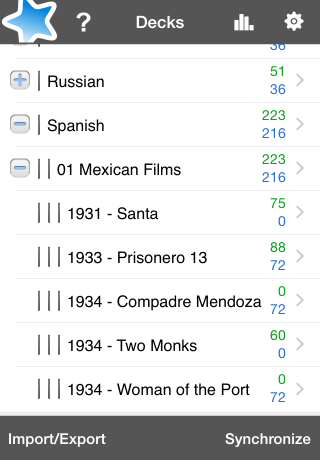 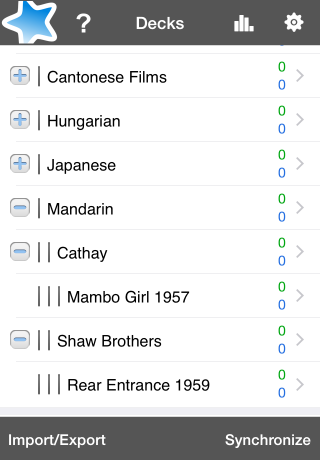
So onto the method itself. So I think the default intervals for Anki are aimed more at learning 1 new vocab word at a time and memorizing it as soon as you see it and building knowledge up block my block. I've been using Subs2SRS decks for a long time now, but using the default anki intervals it would take me months just to work through a single film, so it wasn't really practical to study film history that way.
Now I don't treat like anki reviews as getting things right or wrong, but I think of it more as a scheduler for when I want to see cards again, and I've greatly widened the intervals. When I first see a card my options are 3 minutes, 5 days, or 9 days, and if I mark a card as "wrong" I see it in 3 days. This allows my SRS decks to be a lot more like L-R, I'm not trying to memorize everything on ever card, just seeing lots of content with the images and the ability to replay audio and hide and reveal subtitles. I absorb what's easy for my level and periodically review content to push what I learn into my long term memory and to learn new things that might not have stood out the first time I run into a sentence.
New Intervals:
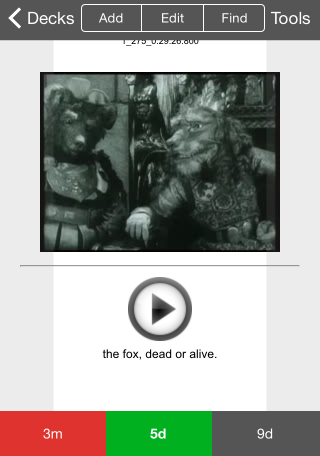 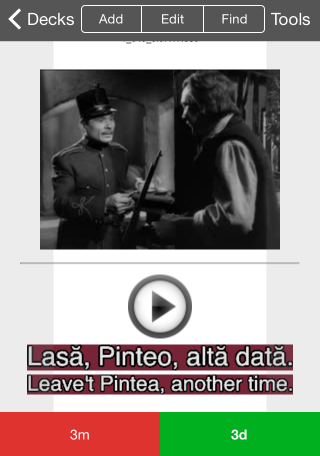
Though I haven't completely eliminated older forms of study, two methods I think are still useful is I still use ear trainers to help me distinguish between similar sounds in various languages I'm study. And when I can find them, sentence decks with some grammar notes attached to them can be enormously helpful to make sense of things and not try to figure out grammar from nothing.
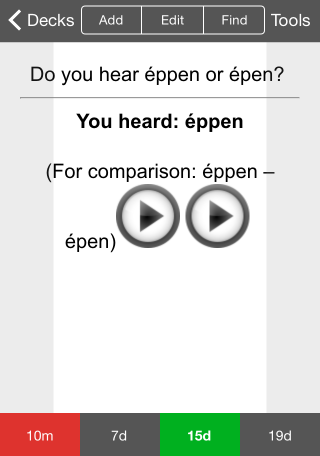 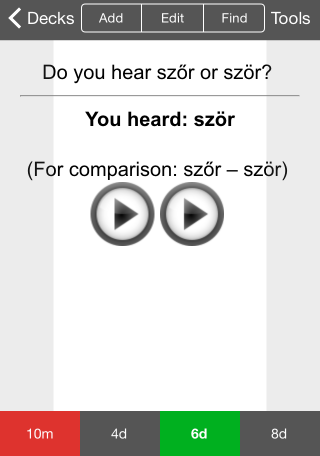
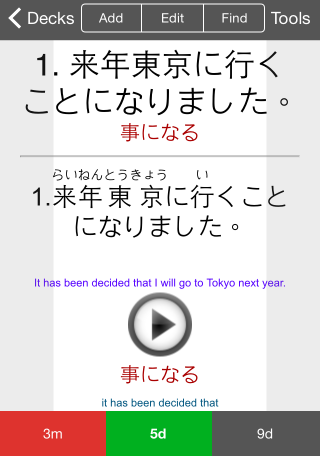 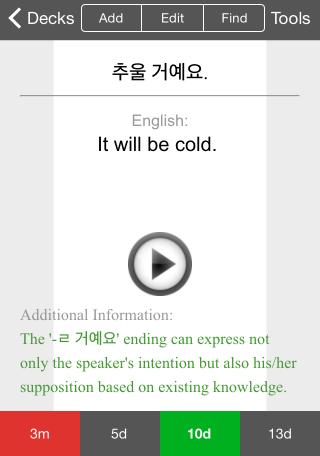
For the most part I'm sticking to languages I'm either Upper Beginner/Intermediate in or languages that are closely related to languages I'm in that level in. But I am experimenting a bit with trying to start new language families from scratch using mostly subs2SRS. With these languages I'm also incorporating some basic sentences into Anki, usually from the pod101 type courses just to help speed up the transition to understanding native materials without having to pick out simple sentences from the subs2SRS decks to try and puzzle out the rest.
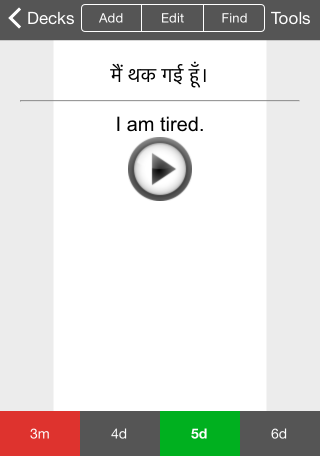 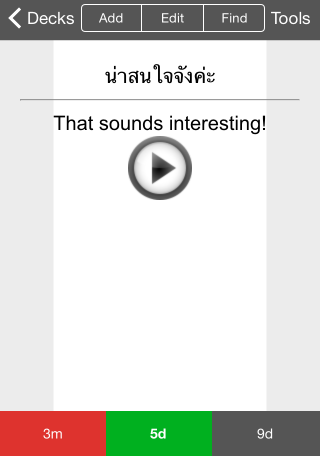
No idea how much of this will end up changing eventually, a lot of these ideas are still very experimental. But I'm thrilled to be able to merge my film history studies better with my language studies and don't see myself going back to my old methods without really strong reasons.
Edited by YnEoS on 04 November 2014 at 11:40pm
8 persons have voted this message useful
| 
emk
Diglot
Moderator
United States
Joined 5314 days ago
2615 posts - 8806 votes    
Speaks: English*, FrenchB2
Studies: Spanish, Ancient Egyptian
Personal Language Map
| Message 29 of 51 05 November 2014 at 12:32am | IP Logged |
Great post!
One thing I've noticed about subs2srs is that I notice far more details than I ever would by just watching the film. So I always look for films that will withstand close watchings—either because they're very good or a lot of fun.
I'm really fascinated by how you're combining film studies and language learning.
1 person has voted this message useful
| YnEoS
Senior Member
United States
Joined 4036 days ago
472 posts - 893 votes   
Speaks: English*
Studies: German, Russian, Cantonese, Japanese, French, Hungarian, Czech, Swedish, Mandarin, Italian, Spanish
| Message 30 of 51 12 November 2014 at 8:19pm | IP Logged |
Hit a cool new milestone today, I finished working through decks for all the 1930s Mexican Cinema I'm interested in studying so now I'm moving onward to 1940s stuff (and of course reviewing the 1930s content). So far I really like this just as a research method, It's boosting my memory of the details of these films a ton, and painlessly picking up some Spanish at the same time is not too bad either. There are some films I'm interested in that don't have English subtitles available for them, but I may try and see if I can understand some of them after working through the subtitled films.
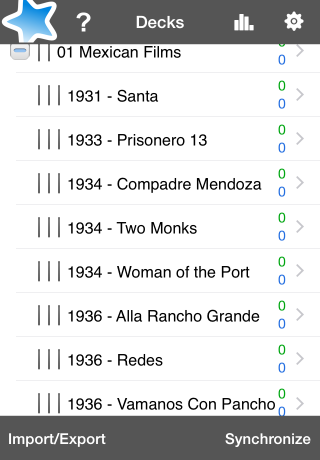
As far as language improvement is concerned things are going pretty well so far, I'm constantly learning new words each study session and of course gettings tons and tons of reinforcement of stuff I already know. I'm in more of a review phase now where I'm inputting fewer new movies and trying to strengthen my knowledge of the ones I have cycling through every day.
Assuming the process is like L-R the first pass or so I usually pick up the movie specific vocabulary that get's thrown around a lot, the words that characters discuss and repeat, this hungarian card is a good example of the words that just instantly download into your brain.
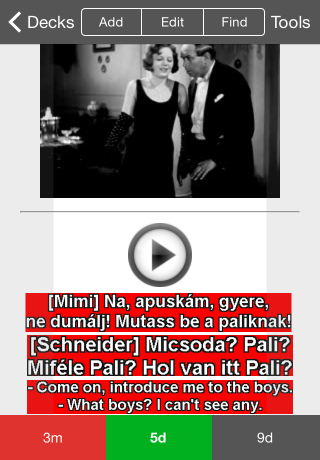
These may be common words that are useful for general learning, but very often they're movie specific vocabulary that isn't helpful for overall language process but makes the 2nd and 3rd passes easier. These words are now locked in so I noticed the words around them more.
I never really committed to L-R a book more than 3 or 4 times, but I have memorized an Assimil course or two with shadowing and if this progresses the same way, then after I learn all the common vocabulary then it will become easier to focus on rarer words and also start noticing more grammar nuances that pop up.
Another fun thing that's happening even though I didn't actively plan for it when picking my decks, I noticed that I have at least 1 musical for almost all of my languages, which can super amplify the ear worm factor of anki, though occasionally the lyrics aren't very easy to hear, especially in old musicals. Just for fun to see how much I could amp this up, I put in a Chinese opera film into my rotation which is like 80% singing.
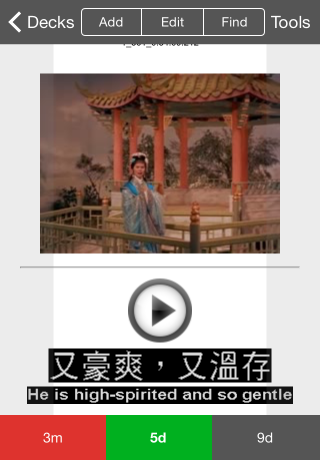
So far I've only hit 2 small roadblocks, with Thai and Hindi. With Thai the grammar isn't really similar to any other language I'm studying so even the basic sentence cards I had from thaipod101 were giving me trouble. Luckily I found an even simpler sentence deck with audio on ankiweb, which repeats words a lot more, so far I'm starting to see better results.
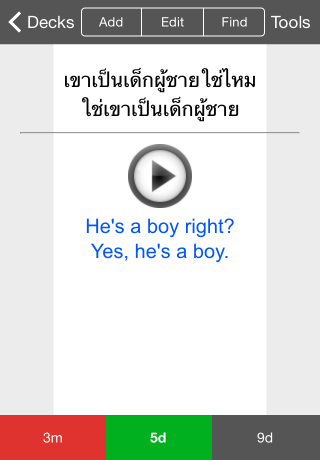
My Hindi problem is a bit tricker. With Hindi I had the smallest basic sentence deck of the non-transparent languages I'm studying. Now Hindi is indo-european so the grammar isn't too strange, and I've learned all my basic sentence cards, but the problem is there weren't really enough of them to make a good bridge to subs2SRS. Now I am learning new stuff from my subs2SRS deck every time I open it, but at a rate much slower than my other languages. I think if I keep adding decks eventually I'll accumulate enough basic sentences that I'll start learning Hindi, but I'm not too big a fan of waiting for this.
I may consider doing a bit of course work for Hindi or maybe trying to find a kids movie to subs2SRS but I'm not entirely sure at the moment.
Anyways that's all for now, I expect after I've lived through this review phase for a few weeks I'll be able to evaluate my overall progress a bit better.
2 persons have voted this message useful
| YnEoS
Senior Member
United States
Joined 4036 days ago
472 posts - 893 votes   
Speaks: English*
Studies: German, Russian, Cantonese, Japanese, French, Hungarian, Czech, Swedish, Mandarin, Italian, Spanish
| Message 31 of 51 16 November 2014 at 5:35am | IP Logged |
Today I started playing around with converting Coursera videos into flash cards with subs2SRS. Finding a good course that I'm interested in, in a language I'm studying is a bit tricky, but really exciting when something suitable turns up.
I'm beginning with a mandarin language class called The Beauty of Kunqu Opera.

Unfortunately the course doesn't have English subtitles, so I had to resort to a machine translation, but I can read enough of the Chinese to figure out the audio and just use the machine English to figure out new words. So far this seems really useful, the card repeat a lot more vocabulary and the content will be more useful for transitioning into reading than movie subtitles. While the language selection still isn't really wide enough to take over a major portion of my studies, it definitely seems like an excellent resource that I will try to utilize as much as possible.
 
Edited by YnEoS on 16 November 2014 at 5:41am
1 person has voted this message useful
| YnEoS
Senior Member
United States
Joined 4036 days ago
472 posts - 893 votes   
Speaks: English*
Studies: German, Russian, Cantonese, Japanese, French, Hungarian, Czech, Swedish, Mandarin, Italian, Spanish
| Message 32 of 51 16 November 2014 at 3:08pm | IP Logged |
So I've started subs2SRSing my first Cantinflas movie, and I have to say verbal comedians seem to make for the absolute best subs2SRS material. Lots of word play means lots of repetition, which means a lot more words stick more readily.
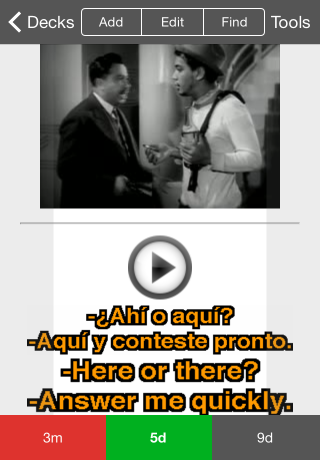 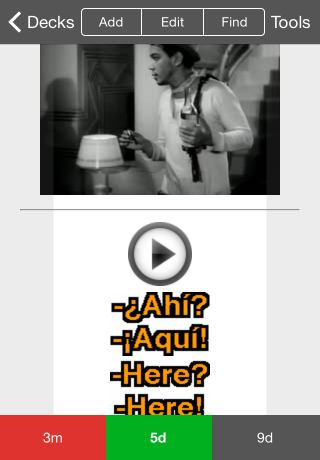
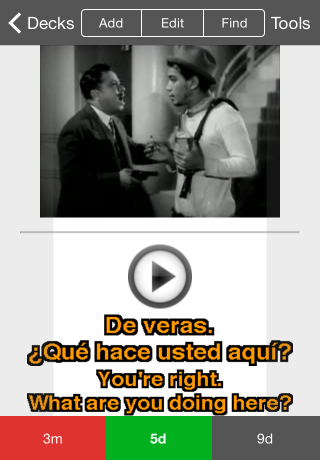 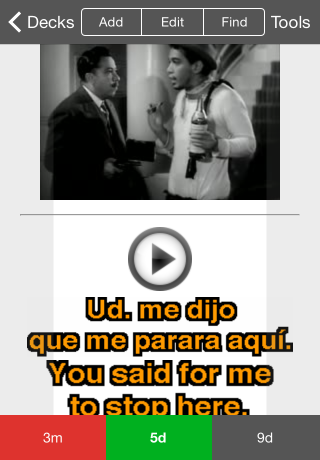
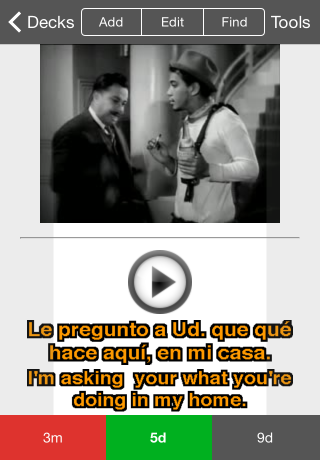 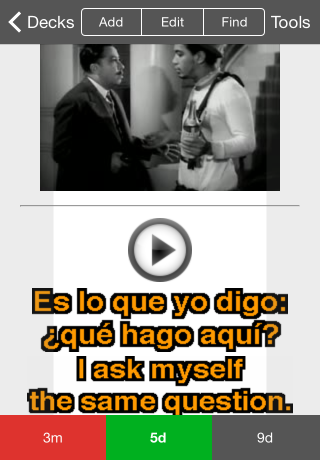
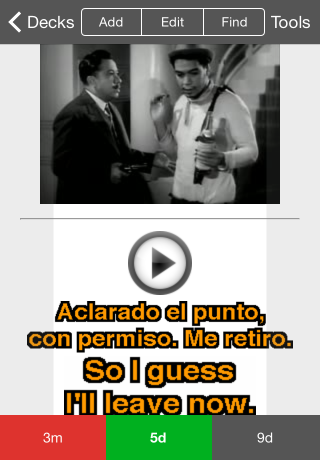 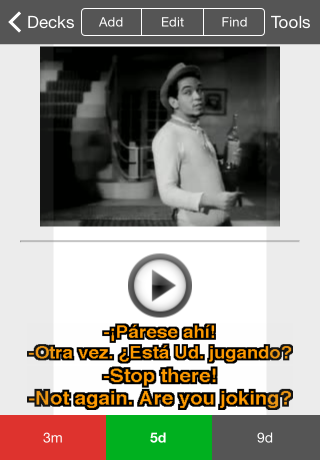
1 person has voted this message useful
|
You cannot post new topics in this forum - You cannot reply to topics in this forum - You cannot delete your posts in this forum
You cannot edit your posts in this forum - You cannot create polls in this forum - You cannot vote in polls in this forum
This page was generated in 0.6563 seconds.
DHTML Menu By Milonic JavaScript
|




































